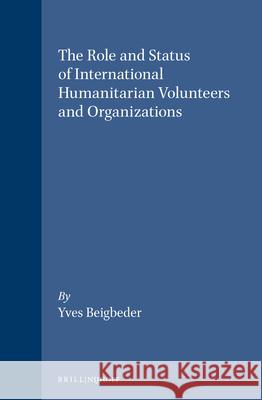The Role and Status of International Humanitarian Volunteers and Organizations: The Right and Duty to Humanitarian Assistance » książka
The Role and Status of International Humanitarian Volunteers and Organizations: The Right and Duty to Humanitarian Assistance
ISBN-13: 9780792311904 / Angielski / Twarda / 1991 / 432 str.
The Role and Status of International Humanitarian Volunteers and Organizations: The Right and Duty to Humanitarian Assistance
ISBN-13: 9780792311904 / Angielski / Twarda / 1991 / 432 str.
(netto: 1026,29 VAT: 5%)
Najniższa cena z 30 dni: 1077,60
ok. 30 dni roboczych
Bez gwarancji dostawy przed świętami
Darmowa dostawa!
Since its birth with the creation of the international Red Cross in 1863, international humanitarian assistance has developed considerably since World War II. In accordance with the Red Cross principle of humanity, it aims at preventing and alleviating human suffering wherever it may be found, protecting life and health and ensuring respect for the human being. International humanitarian assistance involves a complex network of government agencies, intergovernmental and non-governmental organizations, and individual volunteers: it has been labelled a non-system'. While governments and intergovernmental organizations play a dominant and structured role in this field, the non-governmental organizations and their volunteers have proved to be their necessary operational partners, providing material, medical and moral relief and care wherever it may be needed, beyond borders, at the grassroots level. Following a brief review of recent humanitarian activities of intergovernmental organizations, and an analysis of current trends of voluntarism, this book focuses on the role, status and attitudes of the major humanitarian non-governmental organizations, including the Red Cross organizations, the British charities, Church-related agencies, medical volunteers (such as the French Doctors') and U.N. volunteers. Should humanitarian non-governmental organizations provide relief assistance with the Red Cross concern for discretion, neutrality and impartiality? Or should they bear witness and denounce publicly human rights violations, at the risk of being expelled from recipient countries and having to stop their assistance? The controversial claim of a right' to receive and a duty' to provide humanitarian assistance beyond borders is also addressed, as well as the possible need for a status to be accorded to international volunteers.











